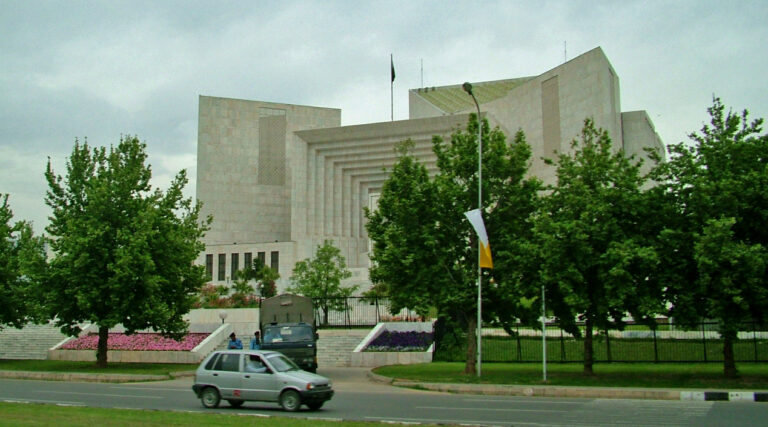
No Kings?: Plenitudo potestatis and the sanctity of US national security
Elizabeth Shakman Hurd
Doctrine of the Two Swords by Unknown (US-PD)
This article is part of our series on Law, Religion, and Immigration. If you’d like to explore other articles in this series, click here.
In the domain of U.S. immigration and border enforcement, one might assume that a consideration of religion would lead to a discussion of xenophobia and anti-Muslim racism. Indeed, Trump’s Presidential Proclamation 9645 of 2017, popularly known as the Muslim ban, would seem to be an example. The ban arrived on a high tide of anti-Muslim rhetoric from the U.S. government and targeted Muslim-majority countries above others. Opponents found plenty of material with which to argue unconstitutional religious bias; their argument seemed formidable, but of course they lost. The Supreme Court upheld the ban 4-3 in Trump v. Hawaii (2018).
How could a forceful defense of religious rights and freedoms be so easily neutralized in that decision? How could the arguments of those backing the government’s dubious claim that precautionary measures against suspect states and populations were essential to national security be so effortlessly vindicated? How did Chief Justice Roberts plausibly conclude that, in his words, the order is “expressly premised on legitimate purposes…The text says nothing about religion”?
To explore the intersection of religion, law, and immigration, as proposed by this series, and to approach the 2017 travel ban as an illustration of this intersection, it is helpful to consider the state as more than merely a political domain or entity that religion confronts from the outside. The state is religious and political from the inside out. It has in fact inherited certain tendencies from the medieval church, as we will see momentarily.
A closer look at the legal history of the Muslim ban is instructive. After several drafts, with refinements designed to pass legal muster, Trump’s Proclamation 9645 closed US borders for four years to foreign nationals hailing from a set of primarily majority-Muslim countries. Legal challenges wound their way up to the Supreme Court, where the majority and both dissents agreed that President Trump’s public statements in the lead-up to the ban exhibited anti-Muslim animus. The evidence on that count was uncontested. Yet the majority subordinated a concern for anti-Muslim animus to the primacy of the president’s interpretation of national security, and, in so doing, deferred to a long tradition of extraordinary executive authority known as the plenary power. In Trump v. Hawaii the majority gave their legal (if not moral) stamp of approval to what lead counsel for the plaintiffs, Neal Katyal described as “a ban on foreign nationals’ entry to the country using a facially neutral policy that predominantly impacts Muslim-majority nations.”
The decision sparked a vigorous backlash. Protestors rushed to airports, signs in hand, eager to offer solidarity to those delayed or detained as they arrived. Immigration attorneys and translators mobilized pro bono to support those in the crosshairs. Protestors accused the Supreme Court of racism, xenophobia, Islamophobia, and of effectively reinstating (while formally overturning) the infamous 1944 Korematsu decision that legitimated Japanese internment during World War II.
Almost without exception, the protestors focused their attention on anti-Muslim bias. Religious discrimination, they reasoned, is un-American and should be illegal. This position anchored a seething dissent in which Justice Sotomayor, joined by Justice Ginsburg, argued that “a reasonable observer would conclude that the Proclamation was motivated by anti-Muslim animus” and accused the majority of brushing aside the fact that the proclamation clearly “runs afoul of the Establishment Clause’s guarantee of religious neutrality.” In Sotomayor’s estimation, the First Amendment “stands as a bulwark against official religious prejudice and embodies our Nation’s deep commitment to religious plurality and tolerance.”
And yet in this case it did not. At the end of the day, the First Amendment failed to stand as a bulwark against official religious prejudice because the Court’s majority framed the issue as a question of national security. And national-security reasoning gets special standing in American law. This special standing is the focus of this post. The problem of national-security exceptionalism lies at the heart of the Muslim ban. It is also at the heart of today’s quasi-coups in the states, as the White House uses the military to enforce its domestic edicts.
The U.S. government is poorly equipped to address this situation because it is in part responsible for creating it. In the U.S., interpretations of national security have always been shot through with cultural assumptions about what it means to be moderately religious, properly American, and truly free. U.S. law has always incorporated and defended discriminatory racial and religious hierarchies in the name of national security. As Iza Hussin has shown, the law in the US and around the world conscripts particular understandings of religion, freedom, and moderation via mechanisms aimed at promoting national security.
In Trump v. Hawaii the majority agreed with both dissents that anti-Muslim animus was a motivating factor in Proclamation 9645. The gap that separated the majority from the dissenters was over whether that animus made it illegal or not. For the majority, national security, and specifically deference to presidential authority over borders and immigration, overrode concerns about racial and religious discrimination.
The Court granted the president virtually unlimited powers to determine policy involving national and border security. By doing so, the majority ceded a form of sovereign immunity to the executive in deference to the plenary power. Presidential actions in this domain became untouchable, almost sacred. Conveniently for the ban’s proponents, it allowed the Court to elide a long history of racial and religious animus embedded in and reproduced through national security law and policy since the founding of the United States. This is particularly the case when it comes to border enforcement. In the face of the majority’s deference to the president’s interpretation of national and border security, animus against a particular group did not matter.
That Trump’s anti-Muslim animus motivated Proclamation 9645 was as clear as it was legal. Protestors decrying the injustice of anti-Muslim discrimination were shouting into the wind.
Why this deference to the plenary power? The plenary power is a set of legal conventions positing that rules for entry and exit to the United States and the determination of the status of aliens are federal powers that are largely insulated from judicial review. This doctrine was determinative in Trump v. Hawaii; according to Aziz Huq, the ruling “entrenches a basic division in the constitutional law of discrimination: Those challenging public order policies—in the [domains of] policing, immigration, and national security—will obtain no relief from the Courts.” Even if anti-Muslim animus had motivated the ban, which of course it did, the majority interpreted the plenary power such that assessing motivation for the orders fell outside the purview of the court’s authority. The expression of religious animus could not override the president’s unchecked authority to regulate the border in the name of national security.
Perched at the threshold between legality and extralegality, national and border security evoke a rich political-theological history of raison d’etat. They ride a wave of bipartisan support, well-sustained across time, and end up as commitments as strong as almost any other acts of social participation. Among government officials, academics, the media, law enforcement, the military and defense establishment, and much of the American public, to proselytize in the name of “national security” is not only admired but expected. In this domain, almost anything goes. Though Congress attempted to place limits around the plenary power following the Watergate scandal in the 1970s, that framework has eroded and since then its invocation has run rampant. Since 9/11, both Democrats and Republicans have supported virtually unlimited presidential powers in the name of national security. Peter Shane, author of Madison’s Nightmare: How Executive Power Threatens American Democracy, describes this as a “lawless era of aggressive presidentialism.” What Katyal called “very-near-blind deference to the executive branch” has come to seem natural and normal in the United States.
How does the plenary power maintain its legitimacy and longevity in a context in which it is allegedly the people who are sovereign?
It may be helpful to visit some of the antecedents of this concept in the medieval notion of plenitudo potestatis, or “fullness of power,” a term usually used to describe the jurisdictional power of the papacy in the Middle Ages. The term has appeared in canonical writings since the time of Pope Leo I (440-461), although it was Pope Innocent III (1198-1216) who first used it on a regular basis to describe papal temporal authority. International relations scholar Andrew Latham argues that the concept has had a “lasting impact on theories of sovereignty,” noting that Innocent III distinguished between two types of power wielded by the pope: “On the one hand, both popes and bishops possessed what he called ‘ordinary’ authority—that is, legitimate power derived from, and limited by, human law, tradition, and custom.” However, Latham further observes, “On the other hand, Innocent argued that the pope, by virtue of his being the vicarius Christi, also possessed an extraordinary form of authority, which he labeled “divine” authority. This authority, reserved exclusively to the papal office, allowed popes to exercise Christ’s extraordinary prerogative to transcend human law, tradition, and custom in certain circumstances.”
The plenary power invokes this extraordinary prerogative by allowing U.S. presidents to transcend human law, tradition, and custom in certain circumstances, including and perhaps especially in the domain of immigration and borders. Chief Justice Roberts confirms that, “by its terms, §1182(f) exudes deference to the President in every clause.” He declares further, “At the heart of their case is a series of statements by the President and his advisers both during the campaign and since the President assumed office. The issue, however, is not whether to denounce the President’s statements, but the significance of those statements in reviewing a Presidential directive, neutral on its face, addressing a matter within the core of executive responsibility. In doing so, the Court must consider not only the statements of a particular President, but also the authority of the Presidency itself.”
In a series of commentaries based on Innocent III’s decretals, Hostiensis, who became cardinal bishop of Ostia in 1262, further developed Innocent’s concept of plenitudo potestatis. Among Hostiensis’s contributions was “to enumerate the specific legal powers inherent in the pope’s plenitudo potestatis” which included an “attempt to parse the phrase ‘above the law’” (supra ius or supra omnia iura). Hostiensis reasoned that the power to act above the law also entailed the authority to dispense from the law. Though he contended that a valid reason was required to act above the law, Latham explains that, “he also believed that, ultimately, it was the pope himself who had the power to determine whether such cause or reason existed in any given case.” For Hostiensis, the pope exercised both ordinary power (potestas ordinata) to act within the law as well as potestas absoluta, the power to act beyond the law.
In placing national and border security above the reach of the law, the Court defers to the exceptionalist language of the potestas absoluta, reinforcing the president’s unchecked authority in this domain. This has facilitated the targeting of Muslims and anyone perceived as Muslim at U.S. borders, meaning – in principle – everyone everywhere. It has vindicated the views of Americans for whom national security and anti-Muslim animus are indissociable. It has laundered the ban into something that somehow passes as legal.
Today Americans are confronting rampant and flagrant abuses of executive authority on almost every front. It was almost unremarkable when on June 4, 2025, the second Trump administration announced a new and more draconian travel ban, Proclamation 10949, targeting 19 countries, primarily in the Middle East and North Africa, and sub-Saharan Africa. Trump stated that “we will restore the travel ban, some people call it the Trump travel ban, and keep the radical Islamic terrorists out of our country that was upheld by the Supreme Court.” In response, opponents such as Democratic congressman Don Beyer of Virginia reiterated the honest but toothless liberal criticisms of the 2017 ban, countering that “the true rationale isn’t security, it’s racism.” It is, of course, both. Trump’s allies know this well.
The exercise of unchecked power and attempted domination of anyone the president perceives to be an opponent has not stopped at travel bans. Trump is now turning the law and the military against the American people. My neighbors in Evanston, Illinois are among those targeted. The people and their representatives must put a stop on unchecked presidential authority. In the words of Evanston Mayor Daniel Biss, “To Gregory Bovino, Kristi Noem, Immigration and Customs Enforcement, and Customs and Border Protection: Get the hell out of our city.” Absent this kind of accountability, it is difficult to imagine anything other than an ever-deepening entrenchment of the shambolic reign of a would-be king, flaunting his ridiculous claim to potestas absoluta. ♦

Elizabeth Shakman Hurd is Professor and Chair of Religious Studies and Professor of Political Science at Northwestern University. This essay draws in part on her new book Heaven Has a Wall: Religion, Borders, and the Global United States (Chicago: University of Chicago Press, 2025).
Recommended Citation
Hurd, Elizabeth Shakman. “No Kings?: Plenitudo potestatis and the sanctity of US national security.” Canopy Forum, November 15, 2025. https://canopyforum.org/2025/11/15/no-kings-plenitudo-potestatis-and-the-sanctity-of-us-national-security/
Recent Posts










